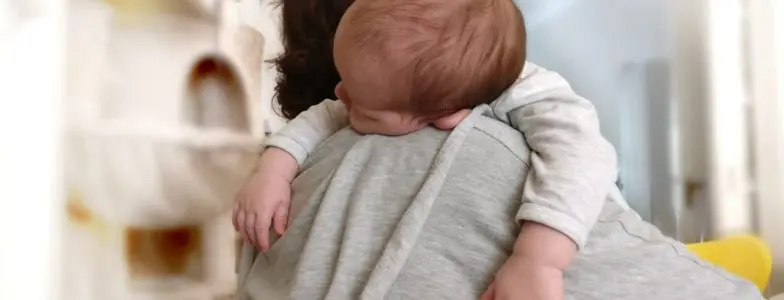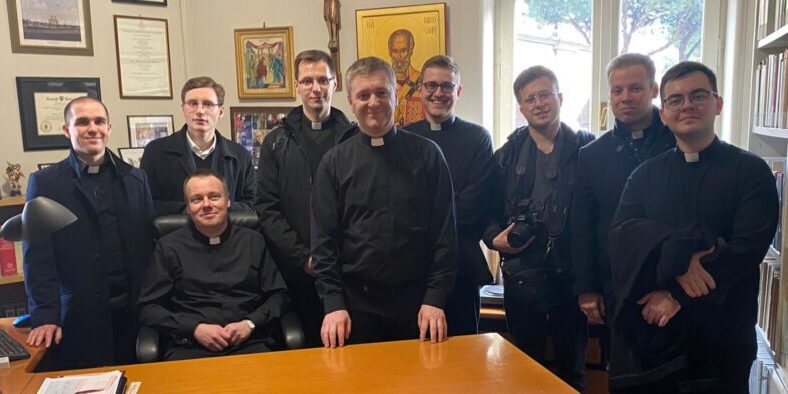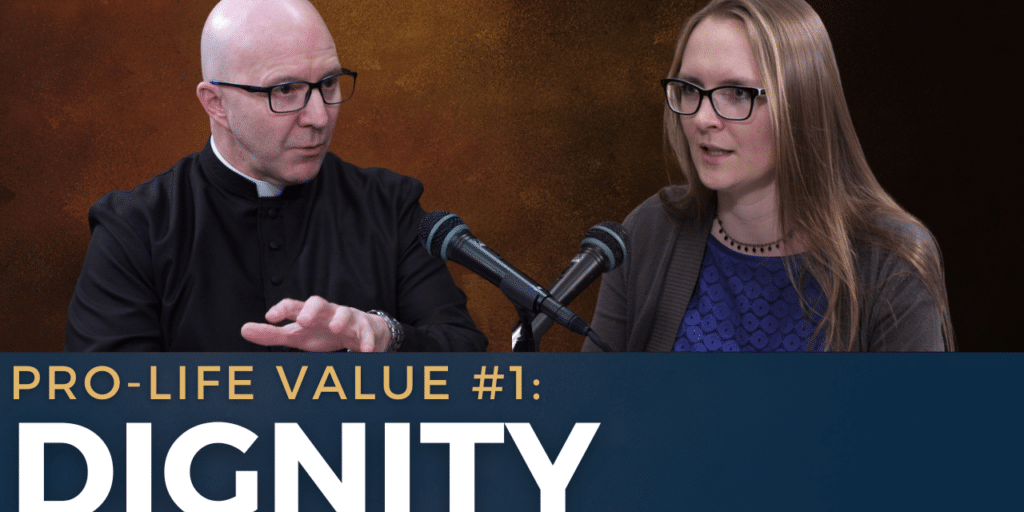Celebrating The Day of the Unborn Child
The one who accepted “Life” in the name of all and for the sake of all was Mary, the Virgin Mother; she is thus most closely and personally associated with the Gospel of life. Mary’s consent at the Annunciation and her motherhood stand at the very beginning of the mystery of life which Christ came to bestow on humanity (cf. Jn 10:10). Through her acceptance and loving care for the life of the Incarnate Word, human life has been rescued from condemnation to final and eternal death.
─ Pope St. John Paul II, Evangelium Vitae, no. 102
Objectively speaking, there is only one appropriate response to the news that a new human life has come into existence: gratitude. Every human life is such a miracle that we ought to be awestruck every time we learn that a child has been conceived. Every child, without exception, is a gift from God and is to be welcomed, loved, and protected.
Subjectively, however, the reality is much more complex. We live in a world scarred by the effects of sin, including uncertainty, suffering, and death. As a consequence, even when the news of the conception of a child is met with joy, that joy is often mixed with fear and anxiety. In many cases, fear and anxiety overwhelm joy, so that the new life, instead of being welcomed and celebrated, is looked upon as a burden and a threat.
“Will the child be healthy?” “Will the mother be healthy?” “Will my spouse/partner be there to help raise this child?” “Are we ready to be parents?” “Can we afford a child?” “Will our child live a happy life, or will he/she experience much suffering?” “What about my life and my freedoms; how will this child affect those?”
These are questions that quite naturally occur to parents. Often, there are no good or easy answers. To bring a child into the world is an endeavor that is fraught with uncertainty. It is possible the child will not be healthy. It is possible that the child will bring financial hardship, or will strain the relationship of the parents, or challenge them in ways for which they are ill-prepared. It is possible, too, that the child will misuse his or her gift of freedom, living a life that adds to the suffering of the world, rather than alleviating it.
And yet, for all of that, every wise and healthy society has affirmed the goodness of parenthood and new life. Yes, there are great risks involved in welcoming life; but they are risks worth taking. There are legitimate fears and anxieties; but they are fears and anxieties worth facing. Life is good. Life is a miracle. Parenthood is a gift.
Indeed, at the very heart of the Christian faith is the embodied affirmation of this great truth: that human life is worth living, and that no matter how great the uncertainty, no matter how great the possible suffering, life must be welcomed with open arms, and with great faith and trust. God Himself took on the human form and lived on this earth, showing us once and for all that human beings possess a dignity and value that far surpasses what can be put into words.
Two Great Pro-Life Solemnities
Last week we celebrated the Solemnity of St. Joseph. St. Joseph stands for us as the emblem of the courageous father. Faced with mysteries far beyond his comprehension – the conception of a child through the action of the Holy Spirit – St. Joseph responded with absolute trust in God, assuming a task for which he was unquestionably “unworthy” and “unprepared.”
Who, after all, was he to act as foster-father to the God-Man? Who was he, poor carpenter as he was, to outwit Herod, or to shoulder the enormous responsibilities of providing a suitable life for the Virgin Mary and Christ? What fear, what anxiety St. Joseph had every right to feel! And yet, he trusted and embraced his vocation; he welcomed life.
This week we celebrate another solemnity, and one with even greater lessons and encouragement for those of us working to create a Culture of Life – the Solemnity of the Annunciation.
When the Angel Gabriel appeared to Mary, she too was anxious (“But she was greatly troubled at the saying”) and met the news with questioning (“How will this be, since I am a virgin?”). Surely, in that moment Mary also had some inkling of the great suffering that awaited her and her Son – that her own heart would be pierced by a sword, and that her Son would be rejected by the world.
And yet, her response was one of absolute trust in God’s goodness: “Behold, I am the servant of the Lord; let it be to me according to your word.” (Luke 1:29, 34, 38)
The great tragedy of our society’s acceptance of abortion is that it trains men and women not to face their fears and anxieties with courage, but rather to look for the escape route. But in providing an escape route, abortion not only robs the child of life, it also robs the parents of the opportunity to grow in love, and to open their hearts to the gifts their child might have brought them.
“By abortion, the mother does not learn to love, but kills even her own child to solve her problems,” Mother Teresa famously said. “And, by abortion, that father is told that he does not have to take any responsibility at all for the child he has brought into the world. The father is likely to put other women into the same trouble. So abortion just leads to more abortion. Any country that accepts abortion is not teaching its people to love, but to use any violence to get what they want. This is why the greatest destroyer of love and peace is abortion.”
If only every mother and father the world over would respond to new life with the same trust as the Virgin Mary and St. Joseph, abortion would be eradicated overnight! What a gift, then, the Church gives us in placing these two solemnities within a week of each other at the heart of Lent, punctuating this period of penance with two great, life-affirming celebrations.
March 25 – The Day of the Unborn Child
Pro-life activists have long recognized the close connection between the Solemnity of the Annunciation on March 25 and their mission to ensure that every human life is welcomed, loved, and protected. For that reason, the pro-life movement in many countries has celebrated The Day of the Unborn Child on March 25.
The Day of the Unborn Child was first officially celebrated in Argentina in 1999. (Tragically, earlier this year Argentina legalized abortion. How much more meaningful, and urgent, this day is for our Argentinean brothers and sisters this year! Let us remember to pray especially for them this March 25.)
Under the pontificate of Pope St. John Paul II, the celebration spread to various other countries, becoming a day to honor the value and dignity of every human person from the moment of conception, as well as a day of remembrance for those unborn children who have lost their lives to the violence and crime of abortion.
This celebration reminds us that human beings, made in the image of God, possess something no other creature (except the angels) can boast – the potential for intimate friendship with God. The human person, moreover, enjoys a dignity far surpassing that of any other of God’s creations. This dignity is of incomparable value; it is innate and immutable; it can never be completely erased, whether through sin or through any other misfortune such as sickness, debility, poverty, enslavement, or violence.
Tragically, today, the atrocities against human dignity remain vividly manifest in the evils of abortion, infanticide, euthanasia, and embryonic stem cell research. Many in society approach nascent life with complete disregard, intentionally ignoring and rejecting the developing child’s inalienable human dignity. Moreover, the human embryo, the most vulnerable of our race, is often treated as a commodity, regarded as a mere object for medical and scientific research and advancement (a multi-billion dollar industry). An unborn child, however, is not just a blob of tissues or a clump of cells or an “it” or a “thing”, but rather from the moment of conception, a human boy or girl of incomparable value, a unique human person to be loved, respected, and defended.
Pope St. John Paul II on the occasion of the inauguration of The Day of the Unborn Child on March 25, 1999, said: “The Catholic Church sees in the attacks against human life a grave offense against the Creator (cf. Gaudium et Spes). In this sense, I have not spared any efforts in proclaiming the value and inviolable character of life.”
The Holy Father delivered this message in the Basilica of Guadalupe, where the miraculous image of Our Lady of Guadalupe depicts the Blessed Virgin as pregnant with the Christ-Child. On the occasion he said he wished to make an appeal “to banish for ever every attack against life and to express the hope at the same time that ‘the continent of hope’ will also be the continent of life…a life that is worthy for all! … I express my best wishes that the celebration of ‘The Day of the Unborn Child’ will favor a positive choice in favor of life and the development of a culture in this direction which will assure the promotion of human dignity in every situation.”
Here, then, are just a few concrete ways that pro-life people can celebrate The Day of the Unborn:
- Spiritually adopt an unborn child and pray for him/her and the child’s mother for nine months
- Organize local Marches for Life or Rosary processions to abortion centers or government buildings
- Hold a fundraiser for pro-life groups or pregnancy help centers
- Offer a Mass or a prayer vigil for life
- Organize a Life Chain in your town
- Pray outside an abortion center
- Host a pro-life movie night
- Pass out pro-life literature at your church
- Volunteer at a pregnancy help center
- Set up a “cemetery of the innocents” somewhere in your community to witness to all the lives lost because of abortion
- Organize the construction of a memorial for the unborn at your church
I hope you will join me in celebrating this great solemnity of the Church by seeking some way to reach out to our smallest, most helpless brothers and sisters. In this Year of St. Joseph, let us ask St. Joseph for his intercession that life may be welcomed, loved, respected, served, and defended.
℣. St. Joseph, Guardian of human life and its inherent dignity, from conception to natural death, pray for us.
℟. Amen.
As president of Human Life International, Fr. Boquet is a leading expert on the international pro-life and family movement, having journeyed to nearly 90 countries on pro-life missions over the last decade. Father Boquet works with pro-life and family leaders in 116 counties that partner with HLI to proclaim and advance the Gospel of Life. Read his full bio here.








